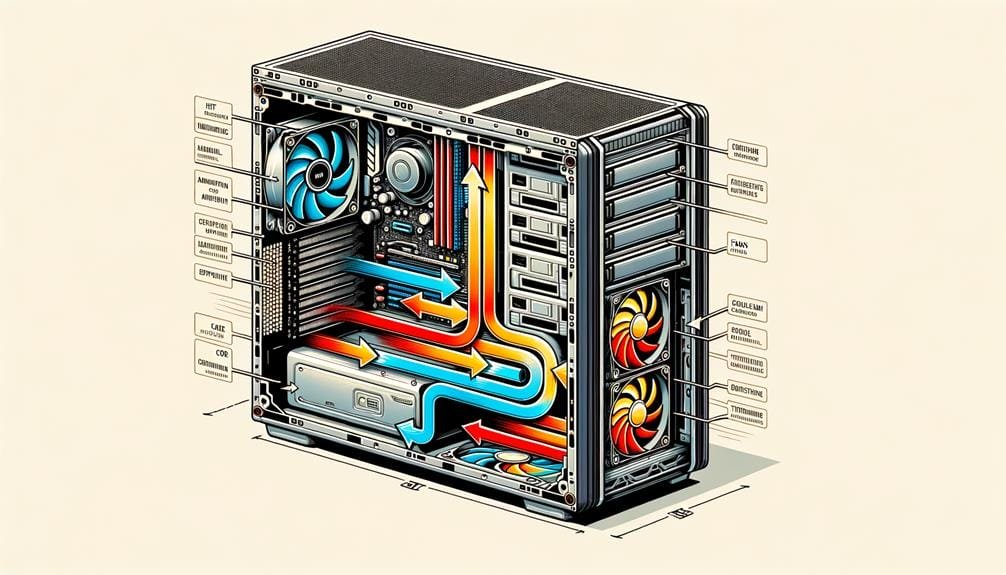Our Newsletter
Sign up for our e-mail newsletter and stay informed for what’s next on the horizon.
‘As the proverb suggests, ‘the devil is in the details,’ and in the realm of PC cooling performance, the case material is a detail that can’t be overlooked. We’re all familiar with the fact that effective airflow is vital, but the significance of case material, whether it’s aluminum, steel, or tempered glass, is often disregarded.
Each possesses unique heat conduction and dissipation characteristics, which influence the overall cooling effectiveness. So, are you intrigued to learn how your choice of PC case material might be subtly affecting your system’s performance?’
Research has revealed that aluminum cases can decrease component temperatures by up to 5% compared to steel. Though this may seem insignificant, it can significantly aid in improving your components’ lifespan and functionality.
Thus, although airflow management is vital, the impact of your computer case material on cooling efficiency should not be disregarded. It’s not just about aesthetics—it’s a key element in the overall efficiency of your system.
Delving into the subject of PC case materials, it’s vital to comprehend that these protective enclosures can be made from a range of materials, such as steel, aluminum, tempered glass, and plastic, each with distinctive attributes related to durability, heat dissipation, noise insulation, and aesthetics.
For instance, aluminum cases are highly popular due to their light weight and superior heat dissipation ability. These are ideal for those who want flexibility in customizing their setups without the burden of weight.
Conversely, steel cases are appreciated for their robust durability and impressive noise insulation. However, they might accumulate more heat, which could be a problem for systems with heavy-duty hardware.
Tempered glass cases, meanwhile, provide a stylish aesthetic, displaying the inner workings of your PC. But, they could accumulate heat if not equipped with adequate ventilation, an important consideration for optimum performance.
Lastly, we’ve plastic cases. These are light and cost-effective, making them a preferred choice for budget-minded users. Nonetheless, they may not be as efficient in dissipating heat, which could affect system stability.
Comprehending these case materials and their attributes is crucial for making a well-informed decision, one that aligns with your computing requirements and aesthetic tastes.
While steel enclosures have the edge in terms of toughness and strength, they substantially affect cooling performance due to their lesser thermal conductivity. Steel’s increased thermal resistance compared to other materials results in heat collection within the enclosure, which can be harmful for high-performance systems.
To provide a clearer view of the impact, we’ve gathered four main points:
Considering these facts, it’s evident that selecting steel enclosures has consequences for your system’s cooling performance. Despite their toughness and durability, the thermal drawbacks may necessitate the procurement of additional cooling systems. This underlines the importance of taking into account not just the build quality, but also the thermal characteristics of the enclosure when planning our systems. The ability to select the correct materials can greatly influence the performance and durability of our setups.

Focusing on aluminum cases, we’ll scrutinize their heat-conducting properties, the influence of design on heat dissipation, and their comparison to other materials.
The innate attributes of aluminum facilitate quick heat dispersion, effectively lowering internal temperatures.
Alongside a lightweight and visually appealing design, these cases provide both fashionability and practicality without sacrificing cooling efficiency.
In the world of PC cases, aluminum’s high thermal conductivity is critical for effectively managing the heat produced by internal components. This special characteristic helps keep temperatures within the case low, thus allowing our systems to operate seamlessly and without any glitches.
Here’s why the thermal conductivity of aluminum is crucial:
Taking advantage of the flexibility that aluminum cases provide, we can construct systems that function at their best, granting us the opportunity to stretch limits.
Frequently, we observe that the configuration of aluminum cases has a crucial function in heat dissipation, utilizing the metal’s exceptional thermal conductivity for effective cooling performance. The metal blend accelerates heat removal from internal components, boosting overall cooling.
Aspects like increased ventilation and airflow alternatives generally found in aluminum cases amplify this benefit further. The lightness of aluminum introduces an additional aspect, allowing high-performance PCs to preserve remarkable cooling abilities without unnecessary weight.
In addition, the thermal efficiency of aluminum cases leads to reduced internal temperatures, resulting in enhanced system stability and lifespan. Therefore, the configuration of aluminum cases can notably optimize heat dissipation, demonstrating their critical part in strengthening cooling performance.
Comparing the thermal properties of aluminum to other materials such as steel or plastic, it’s evident that aluminum cases are superior due to their excellent heat dissipation characteristics. Here’s why:
Investing in aluminum offers the ultimate in cooling flexibility.

Examining the world of tempered glass cases, we observe that their smooth and contemporary design often sacrifices optimal airflow and adds to the overall weight. The solid panels of tempered glass, though visually attractive, can considerably limit airflow, leading to potential airflow constraints.
Let’s look at the following table for a quick comparison:
| Pros | Cons | Potential Solutions |
|---|---|---|
| Pleasing to the eye | Limited airflow | Addition of more fans |
| Displays internal components | More weighty than other materials | Choose lighter components |
| Luxurious feel | Increased internal temperatures | Implement advanced cooling solutions |
| Popular option | Need for additional cooling solutions | Implement liquid cooling |
As can be seen, the downsides mainly concern heat management. The restricted ventilation in these cases can lead to elevated internal temperatures, necessitating extra cooling solutions. In spite of these, tempered glass cases remain a favored option, mainly for their display potential and high-end design.
Our attention is now directed towards composite material cases, which combine a variety of materials such as plastic, metal, and other composites. This unique combination provides a balance of strength, lightweight construction, and cost-effectiveness.
However, it’s critical to evaluate how this blend affects heat dissipation, cooling efficiency, and the relevance of aspects like airflow control and fan positioning.
Exploring the field of composite material cases, it’s evident that these multi-material structures, incorporating plastic, metal, and glass, expertly balance resilience and aesthetics. They provide a cooling solution that merges hard-wearing nature with lightweight build, and provide effective thermal insulation.
To deepen the understanding, let’s examine these points:
Often overlooked, the composite materials utilized in PC cases are instrumental in maximizing cooling efficiency. The selection between aluminum and plastic composites can greatly impact heat dissipation and the functionality of case fans.
| Composite Material | Impact on Cooling Efficiency |
|---|---|
| Aluminum | High thermal conductivity aids in heat dissipation, improving cooling performance |
| Plastic | Lower thermal conductivity may restrict heat dissipation, possibly affecting cooling performance |
We notice that aluminum composites, though robust and slightly heavier, deliver superior cooling by effectively conducting heat away from PC components. Plastic composites, though lightweight and cost-saving, may not offer the same level of efficiency. Thus, picking the appropriate composite material is a significant step in maintaining optimal temperature regulation, ensuring the unrestricted performance of your system.

In fine-tuning the cooling efficiency of a computer system, the case material plays an indispensable role. It exerts a substantial impact on heat discharge and internal temperatures. With a suitable choice of material, optimum thermal regulation within the system can be accomplished.
We delve into four principal elements:
Investigations have shown that aluminum enclosures can lower component temperatures by as much as 5% in comparison to steel. This might appear minor, but it can contribute substantially to the longevity and performance of your components.
Hence, while the management of airflow is paramount, the significance of your computer case material on cooling performance shouldn’t be overlooked. It’s not solely about looks—it’s a crucial factor in the overall effectiveness of your system.
Indeed, it has been observed that the materials used in the construction of a PC case can influence its cooling capabilities. Cases made from aluminum are more efficient at heat dispersion, whereas those crafted from steel offer greater durability. The presence of tempered glass could interfere with air circulation, thus making it crucial to manage airflow correctly within the system.
We can assert that a PC case does have an effect on performance. It’s not solely about looks—the case’s substance impacts how well it can dissipate heat, which subsequently affects the operational effectiveness and lifespan of your computer’s parts. Therefore, it’s advised to make a smart choice!
Our research indicates that the material of the PC case does indeed affect airflow. Cases made of aluminum and mesh panels facilitate superior heat dispersion, whereas those constructed from steel, acrylic, or glass can obstruct airflow due to their diminished thermal conductivity.
Our research indicates that an open case doesn’t automatically lead to improved cooling. It could potentially disrupt the effective flow of air and heighten the accumulation of dust. Cases that are closed and have a well-thought-out airflow design typically cool down components more efficiently.
Sign up for our e-mail newsletter and stay informed for what’s next on the horizon.